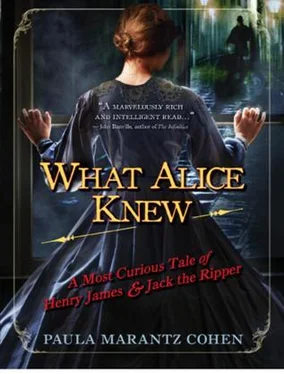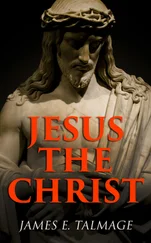On the other side of the room, some four or five officers were attending to an older man in uniform with a puffed-up manner. He was barking orders, and they were scurrying in and out of the room, handing him notes and official documents.
In the midst of this scene, William spotted Abberline seated alone in a corner. He walked over to the inspector. “Is it possible that you have a suspect?” he asked.
“ I don’t have a suspect,” replied Abberline testily, “but our assistant commissioner, Sir Robert Anderson, apparently does. He has just come back from the Continent and assumed control of the case. Commissioner Warren is perfectly satisfied to hand over the reins, so long as he isn’t bothered. The result is that Sir Robert,” Abberline spit out the honorific, “has arrested someone who suits the cut of his prejudices. I thought you might find his methods of interest, given your work in psychological deviance.”
He made this assertion with a sneer but seemed disinclined to say more, and William felt it best to leave him alone and mix among the officers nearby. He did this, as he sometimes did at professional meetings when he wished to get a sense of prevailing opinion or pick up salient facts. He walked about with an indifferent air, peering casually over the shoulders of the milling officers, glancing at the documents in their hands, and eavesdropping on their conversation.
After an interval of perhaps a quarter of an hour, Anderson suddenly spoke to the assembled group. “Welcome, gentlemen,” he began in the pompous, affected tone that William had come to associate with higher ranking officials in this country. “In the short time I have been back on English soil, I am pleased to have made significant headway in the Whitechapel case that, until now, has baffled some of our allegedly best officers.” He glanced superciliously at Abberline, who glared back at him. It was clear that the two men loathed each other.
“I now present to you Mr. Benjamin Cohen, a suspect whom we apprehended only this morning.” Anderson gestured with a flourish in the direction of the young man in the long coat who had been led to the center of the room.
“Upon what evidence do you arrest this man?” demanded Abberline angrily.
Anderson turned to the inspector and spoke slowly, as though to a dimwit. “A plethora of evidence, sir, which I will now enumerate for you.” He gave a nod to one of his officers, who handed him a sheet of paper. “First, Mr. Cohen’s knowledge of medicine. He is said to have helped a local physician with stitching and dressings and to have accompanied the local midwife on some of her cases.”
Abberline mumbled under his breath, “No good deed goes unpunished,” but Anderson ignored him and moved on. “Secondly, Mr. Cohen has frequented Zionist meetings and, not satisfied with the extreme forbearance of our government toward his people, has protested at various rallies regarding what he deems the ill use of his race. This deep-seated hostility toward Christian society conforms to the message that was written on the wall near the site of the Eddowes murder.”
Abberline seemed about to speak, but Anderson continued without pause.
“Thirdly, there is the suspect’s socially incendiary tendencies. I have the exhibits here of the books found in his room.” He again nodded to the officer next to him and was handed a number of books that he held up by way of demonstration. “Darwin, Marx, Fourier. He is also a member of a Masonic society and is a known freethinker.”
Abberline muttered, “First a religious zealot; now a freethinker,” but was ignored.
“Finally,” pronounced Anderson, casting a triumphant glance at Abberline, “we have an irrefutable piece of material evidence in our possession.” He motioned in the direction of another officer, who came forward and handed him an envelope. Anderson opened it and extracted its contents. “I will pass among you these two photographs, one that was found on the premises of Mr. Cohen’s business and the other that you may recognize from the newspapers if you did not see it here already.”
He handed the photographs to the officer to his right, who passed them to Abberline. He and William looked down at the photographs together.
The first was of a woman seated on a chair. She was naked, though her posture was rather formal and unrevealing, the body positioned sideways, so that only one breast was discernible, and the legs crossed in what might even seem like a prudish posture. The face, however, was turned directly to the camera and registered no embarrassment. The woman was not pretty and not young, but her expression commanded attention, as though, for the purposes of the photograph, she held herself in some esteem.
The other photograph was of a woman stretched out on a slab in the London morgue, her eyes closed, her head thrown back. A line of stitches across the throat indicated where the head, almost severed by the knife’s incision, had been stitched back into place. It was not immediately evident that the two photographs were of the same woman, but a moment’s inspection made clear that they were. It was Polly Nichols.
Anderson stood in smug silence as the photographs were passed around the room. Finally, he spoke again. “If more evidence is needed, we also have a witness. Mr. Nathan Rosenzweig, greengrocer, has provided us with an excellent description of the man who conferred with Polly Nichols on the night of her murder. ‘A thin individual, five foot seven or five foot eight, with dark hair.’ Benjamin Cohen to the letter. We have Mr. Rosenzweig here to make the identification.”
A small, neatly dressed man had been led into the room and was pushed forward.
“You saw the perpetrator speaking to Polly Nichols on the night of her murder?” asked Anderson.
The man looked about him nervously. “I saw someone speaking to someone who might have been Polly. I knew her only in passing. She sometimes sold flowers near the Aldgate Market. Can’t say I knew her.”
“But you thought it was Polly.”
“It might have been Polly. She weren’t the most distinctive-looking girl, and it was dark.”
“And you saw the perpetrator talking to her,” said Anderson, ignoring this caveat.
“I saw her talking to a gentleman. Whether or not he was the perpetrator is another matter,” clarified Rosenzweig.
“A somewhat slight individual of medium stature, dark hair.”
“I suppose that’s right,” said Rosenzweig sulkily.
“This man?” The assistant inspector pointed to Cohen.
Rosenzweig looked at the suspect for a moment. “The man I saw was light complected,” he finally noted. “This man is dark.”
“You said he had dark hair.”
“Dark hair, but fair skin,” Rosenzweig insisted. “It’s not an unusual combination.”
“It is unusual among your people!” snapped Anderson and then motioned for the suspect and the witness to be ushered from the room. Once they were gone, he blithely addressed the gathering. “I rest my case, gentlemen. The final proof is in this man’s recanting of his former testimony in the face of a Jewish perpetrator. It is clear that he knows the man is guilty but will not turn against one of his own race.”
William had been watching Abberline’s face as Anderson made his comments and could see that it had gone from being very pale to very red and that his lips were trembling with anger. He seemed about to voice his objections and, one could tell by the livid expression on his face, that the result would be impolitic—or worse.
William cleared his throat and rose to his feet. “Excuse me for interfering, sir.” He addressed Anderson with exaggerated deference, having found that a bumbling manner, when combined with his gangly, unkempt appearance, could disarm more belligerent sorts of people. “Do you know me? I don’t know if you do, but I’m Professor James from Cambridge, Massachusetts. I was summoned here to help with this case by Sir Charles Warren, who seems, for reasons I hardly warrant, to have a high opinion of my abilities.” He shrugged and assumed a puzzled air, as if to demonstrate his humility.
Читать дальше












